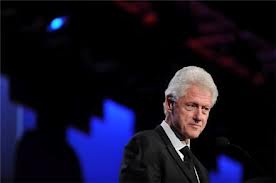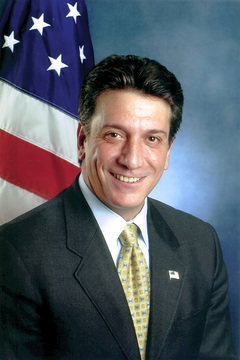
Verazanno-Narrows Bridge at the start of the NYC Marathon
Ahh, running and the law, my sweet spot. Before going on to read this story about the New York City Marathon, I need to tell you that I am planning to run this November for the 14th time. I once did a Blawg Review devoted to the event and had a letter published in the New York Times regarding this magnificent piece of urban theatre. My passion for the event, however, will not temper my comments here.
In the news today, the NYC Marathon decided to cancel its baggage checking at the beginning of the race. And legal problems could result by killing off a service that had been promised, and on which participants relied, when signing up for the race many months ago.
This is the way the service has worked in years past: Runners show up at Fort Wadsworth in Staten Island, sitting at the base of the Verazanno-Narrows Bridge. We arrive by buses and ferry and private cars hours before the event start, because you can’t have 40-50,000 people arrive at the same time. It is a logistical issue that gets coordinated with military precision.
Runners bring many things to this village, including extra clothes to wear in the early morning November chill, as well as dry clothes for the end of the run. Many will bring disposable clothes for the start — I’ve made many a trip to the Salvation Army in the week before to buy a few items that will be discarded as the canon booms for the race’s start.
But the clothes needed for the end of the marathon are what’s really important (not to mention car/house/hotel keys, phones, cash,metro cards, etc.). Once the body cools down at the end of 26.2 you will still wearing wet clothes, socks and sneakers. Any commute longer than an hour is not something you want to be doing while dressed like that.
Because those dry clothes are so valued, runners check their bags on dozens of UPS trucks in the staging area to be reclaimed later. And that leads to the finish area of the NYC Marathon being turned, each year, into the world’s largest locker room as runners strip down and change.
Now that service is gone, and runners are stuck in the wet, smelly clothes. If you live on Manhattan’s Upper West Side and are walking home it isn’t a big deal. But most don’t. And the only solution to the keys/phone/cash problem, is to carry them during the race, which few people really want to do.
The reason for killing off the service is that, at the end of the race in the tight confines of a Central Park roadway, it could take a good 30-45 minutes to retrieve that checked bag. The walk will be another mile, on top of the ones you just ran, as you wind your way through the finishers chute getting food, water, finisher medals, heat shields, medical attention and finally to the endless line of UPS trucks and the lines at each truck waiting for the bags.
The New York Road Runners Club, which puts on the event, has found this logistical nightmare to be too much, even when pulling trucks out of the park last year to use side streets. As they expand upwards to the 50,000 runner barrier – and perhaps beyond in the year to come — they can no longer manage. They either cap the growth of the event, or kill the baggage check.
Because they decided to kill it they will offer to the runners a one-size-fits-all fleece hooded poncho in the finish area. But that only covers up the now-disgusting clothes that are glued to the body; it doesn’t get rid of them.
Is there a legal angle here? I think so. Runners pay a hefty fee to run this race, $216 this year. And one of the things they knew they were getting was the transportation of their clothes, cell phones, wallet, etc. Some stuff can still be stuffed in pockets for those of us who are non-elite, but many really don’t want to carry anything for the race.
Does this lead to a potential consumer class action on behalf of runners? That is certainly a possibility, because they have not offered runners the option of cancelling and getting their money back due to the policy change. According to Business Week:
There will be no reimbursements for runners who don’t agree with the policy change, said Richard Finn, a spokesman for the organization.
Runners, after all, paid for one thing and will receive another. If they wanted to make this change, it was something that should have been announced before registration was opened up.
One other note on my running credentials, I’m also the founder and Race Director of a half marathon trail race just north of New York City. The idea of not having a baggage check is unthinkable to runners. We even have the showers at ours (since we finish at a High School, we use the locker room). I know what it means to runners, both as participant and race director, to have such services.
If you go to Twitter right now, you will see it lighting up with complaints. Mary Wittenberg, the CEO of the New York Road Runners (and former BigLaw attorney and marathon champ), invited comment at #NYRRListens and has been getting an earful. A few select comments:
From @ashlyntastic @INGNYCMarathon There’s nothing I dislike more than marinating in wet running clothes post race. #NYRRlistens
From @arunninglifetc This organization isn’t about serving the runners anymore, not when you don’t listen to the runners. #NYRRListens
From @UrbanRunr Makes no sense for a race in Nov. I’ve never been so cold as after my first NYC. People need their dry clothes after. #NYRRlistens
Someone, somewhere, may elect legal action. (And no, it won’t be me.) Whether it succeeds or not is another story, but clearly the better move would have been to implement the policy change before people started to pay their money.
 I’m sitting here watching Pres. Bill Clinton speak at the Democratic Convention and one thing leaps out at me: he would be a masterful trial lawyer.
I’m sitting here watching Pres. Bill Clinton speak at the Democratic Convention and one thing leaps out at me: he would be a masterful trial lawyer.


